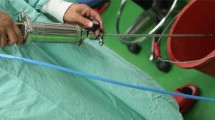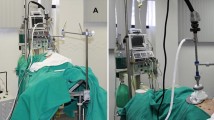Abstract
Background: Animal experiments have shown that carbon dioxide (CO2) laparoscopy results in more port-site recurrences than gasless laparoscopy. Possible transport of aerosolized tumor cells by CO2 was investigated in rats.
Methods: Abdominal cavities of 15 pairs of Wistar Agouti (WAG) rats were connected and 2 × 106 or 16 × 106 CC 531 cells were injected in the first (donor) rat of each pair. Then 10 l of CO2 were allowed to flow from the first (donor) to the second (recipient) rat.
Results: No tumor was found in the recipients after injection of 2 × 106 cells in the donors. Injection of 16 × 106 cells in the donors resulted in very limited tumor growth in the recipients.
Conclusions: Aerosolization of tumor cells occurs, but the number of intraperitoneal tumor cells required for metastases to occur by this mechanism is extremely high. Therefore, aerosolization of tumor cells appears not to be of major relevance in the pathogenesis of port-site metastases.
Similar content being viewed by others
Author information
Authors and Affiliations
Additional information
Received: 12 January 1998/Accepted: 22 February 1999
Rights and permissions
About this article
Cite this article
Wittich, P., Marquet, R.L., Kazemier, G. et al. Port-site metastases after CO2 laparoscopy. Surg Endosc 14, 189–192 (2000). https://doi.org/10.1007/s004649900098
Published:
Issue Date:
DOI: https://doi.org/10.1007/s004649900098




